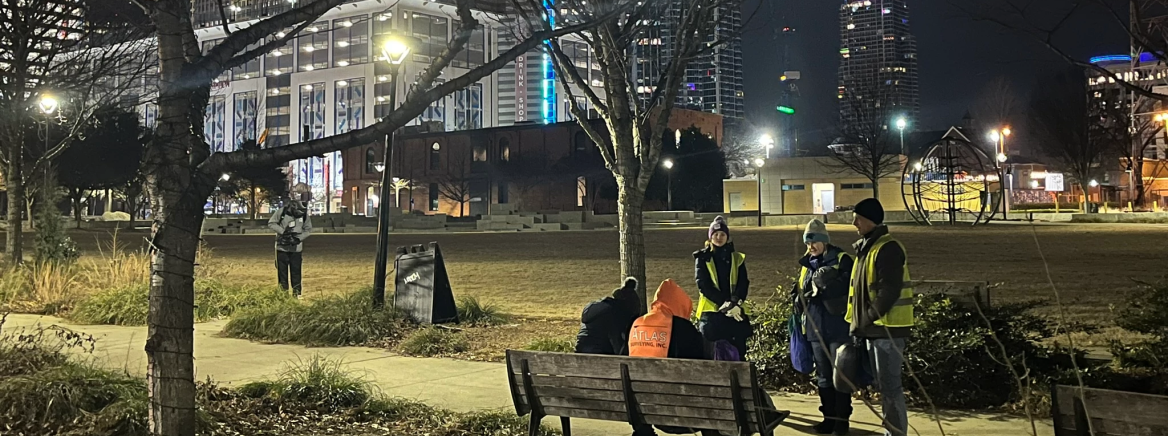Point in Time Count Reveals Faces of Homelessness Amidst Growing Needs

As of April 30, 2025, there were 2,415 men, women, and children experiencing homelessness in Charlotte-Mecklenburg, according to Mecklenburg County’s One Number benchmark.
Among the homeless residents are those surveyed during the annual Point in Time Count, conducted Jan. 22, 2025. The results, released this month, show that the number of unsheltered homeless in the community has increased notably, fueling a greater need for services while resources continue to shrink.
Unsheltered Homelessness: The unsheltered count during the Point in Time Count focuses on individuals residing in locations not intended for human habitation such as streets, cars, parks, and encampments. More than 200 volunteers and police officers canvassed Mecklenburg County to locate, identify, and engage individuals who were living unsheltered, and gather HUD-required demographic information.
The survey revealed 444 people in 421 households were experiencing unsheltered homelessness on the night of the Point in Time Count, an increase of about 16%. That includes four with minor children, the highest number of unsheltered households with minor children counted to date. Of the 444 people, 116 were newly identified this year. This year is the highest unsheltered count since 2010 and more than double the number of people experiencing unsheltered homelessness since the 2020 pre-pandemic count.
Sheltered Homelessness: Thirty-three publicly and privately operated emergency shelter, transitional housing, and safe haven programs from 15 agencies participated in the Point-in-Time Count. The survey revealed 1,320 households totaling 1,657 persons were experiencing sheltered homelessness, about 3.2% fewer people than last year. That decrease is attributed to a drop in the number of shelter beds that are available. Of the households identified in the sheltered homeless census, 308 people were children under the age of 18.
View photos from the 2025 Point in Time Count.
The Point-in-Time Count, coordinated nationally by the Department of Housing and Urban Development (HUD), is conducted each year across the United States to gather data on homelessness. It takes place on a single night in January each year and provides a snapshot of homelessness. The key objectives of the PIT Count are to estimate the number of people experiencing homelessness and to understand their demographic characteristics and living situations. Another goal of finding unsheltered homeless individuals and families is to connect them to available resources.
The Charlotte-Mecklenburg Continuum of Care coordinates these efforts locally. Mecklenburg County Community Support Services’ Housing Innovation and Stabilization Services Division and the Hearts for the Invisible Coalition Charlotte partnered to lead the 2025 Point-in-Time Count.
What Can I Do?
There is much that individuals can do to help: donate food or clothing, volunteer to help at a shelter or food bank, contribute to one of the many nonprofits that assist the homeless, and support government efforts in strategies to address affordable housing.
In its FY2026 budget approved on June 3, the Mecklenburg Board of County Commissioners addressed homelessness and affordable housing by funding a variety of services and programming:
- $1.1 million to annualize the operating costs for Forest Point Place permanent supportive housing for seniors.
- $464,000 for housing placement and navigation, and a subsidy increase for Keeping Families Together.
- $14.3 million for more than 20 nonprofit organizations that work to address homelessness and housing, such as Legal Aid of N.C., the Salvation Army, Roof Above, the Relatives, United Way of Greater Charlotte, and others.
- $12.5 million for 16 organizations that address the Board’s mental and behavioral health priorities, such as Anuvia Prevention and Recovery Center, Promise Resource Network, Teen Health Connection, Alliance Health, and others.
- $2.6 million for Crisis Assistance Ministry.
"The Board is committed to addressing the ongoing issue of homelessness in our community," shared Mecklenburg Board of County Commissioners Chair Mark Jerrell. "The resources in the new fiscal year budget show our commitment to help as many of our unhoused residents as possible."
To learn more about the state of housing in Charlotte-Mecklenburg, visit the Housing and Homelessness Dashboard.

